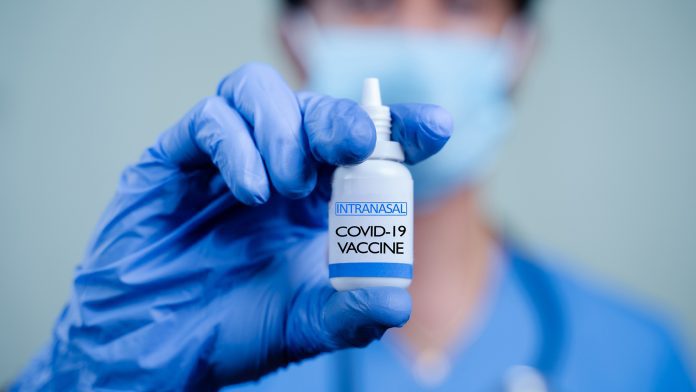
In a groundbreaking development toward curbing the transmission of SARS-CoV-2, scientists have developed an innovative inhaled vaccine for COVID-19 that offers robust disease protection.
Pioneered by a team at McMaster University, the innovative inhaled COVID-19 vaccine has been demonstrated to provide broad, long-lasting protection against the original strain of coronavirus and variants of concern (VOC). A study has signified that the revolutionary inhaled form of COVID-19 vaccine has substantial immune mechanisms and benefits due to being delivered directly into the respiratory tract compared to the standard method injection.
The team’s research is published in the journal Cell.
Developing an inhaled vaccine for COVID-19
The team hypothesised that creating an inhaled vaccine for COVID-19 would be more effective than a needle-administered vaccine at inducing a protective immune response as it would target the lungs and upper airways where respiratory viruses enter the body.
To test this theory, the researchers performed a preclinical study on animal models, which achieved the essential proof of concept to enable a Phase 1 clinical trial, which is currently underway, to assess the potential of an inhaled vaccine for COVID-19 in healthy adults who had received two doses of an mRNA vaccine.
The vaccine development strategy follows the structure of the tuberculosis vaccine research programme created by Zhou Xing, a professor at the McMaster Immunology Research Centre and Department of Medicine and the study’s co-lead author.
Xing commented: “What we’ve discovered from many years’ research is that the vaccine delivered into the lung induces all-around protective respiratory mucosal immunity, a property that the injected vaccine is lacking.”
“We wanted, first and foremost, to design a vaccine that would work well against any variant,” explained the study’s co-lead author Matthew Miller, an associate professor at McMaster’s Michael G. DeGroote Institute for Infectious Disease Research.
Currently, all COVID-19 vaccines that are authorised are injected. The novel inhaled vaccine for COVID-19 is just one of many projects in Canada as part of its Global Nexus for Pandemics and Biological Threats, based at McMaster. The team evaluated two adenovirus platforms for the vaccine, as viruses can serve as vectors that directly transport the vaccine to the lungs without causing illness.
Miller said: “We can remain ahead of the virus with our vaccine strategy. Current vaccines are limited because they will need to be updated and will always be chasing the virus.”
Multi-variant protection
The two types of the inhaled vaccine for COVID-19 showed they are effective against highly transmissible variants as they target three aspects of the virus, including two that are highly conserved among all variants and do not mutate as rapidly as the spike protein, which is the only part of the virus that current vaccines in Canada target.
Miller said: “This vaccine might also provide pre-emptive protection against a future pandemic, and that’s really important because as we’ve seen during this pandemic – and as we saw in 2009 with the swine flu – even when we are able to rapidly make a vaccine for a pandemic virus, it’s already way too late. Millions of people died, even though we were able to make a vaccine in record time.”
“We have revealed in our report that besides neutralising antibodies and T cell immunity, the vaccine delivered into the lungs stimulates a unique form of immunity known as trained innate immunity, which is able to provide very broad protection against many lung pathogens besides SARS-CoV-2,” Xing added.
Further benefits
Being needle and pain-free may potentially help to ease vaccine hesitancy among some individuals; moreover, the inhaled vaccine is so efficient at targeting the lungs and upper airways that it can achieve optimal protection with just a fraction of the dose of current vaccines, maybe as little as 1%. This means that a single batch of the inhaled vaccine for COVID-19 could immunise 100 more people than existing vaccines.
Brian Lichty, an associate professor in the Department of Medicine who co-led the preclinical study, commented: “This pandemic has shown us that vaccine supply can be a huge challenge. Demonstrating that this alternative delivery method can significantly extend vaccine supply could be a game-changer, particularly in a pandemic setting.”

























